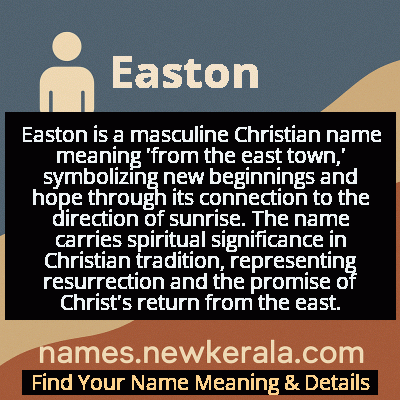Easton Name Meaning & Details
Origin, Popularity, Numerology Analysis & Name Meaning of Easton
Discover the origin, meaning, and cultural significance of the name EASTON. Delve into its historical roots and explore the lasting impact it has had on communities and traditions.
Name
Easton
Gender
Male
Origin
Christian
Lucky Number
2
Meaning of the Name - Easton
Easton is a masculine Christian name meaning 'from the east town,' symbolizing new beginnings and hope through its connection to the direction of sunrise. The name carries spiritual significance in Christian tradition, representing resurrection and the promise of Christ's return from the east.
Easton - Complete Numerology Analysis
Your Numerology Number
Based on Pythagorean Numerology System
Ruling Planet
Moon
Positive Nature
Diplomatic, friendly, artistic, empathetic.
Negative Traits
Over-sensitive, moody, indecisive, prone to self-pity.
Lucky Colours
Green, cream, white.
Lucky Days
Monday.
Lucky Stones
Pearl, moonstone.
Harmony Numbers
1, 3, 4.
Best Suited Professions
Diplomats, mediators, caregivers, artists.
What People Like About You
Cooperative spirit, friendliness, artistic talent.
Famous People Named Easton
Easton Corbin
Country Music Singer
American country music artist with multiple #1 singles on Billboard Country charts
Easton Stick
Professional Football Player
NFL quarterback who won multiple NCAA FCS national championships at North Dakota State
Easton LaChappelle
Inventor/Robotics Engineer
Created affordable 3D-printed prosthetic limbs and founded Unlimited Tomorrow robotics company
Easton Ellis
Author
Bret Easton Ellis, acclaimed novelist known for 'American Psycho' and 'Less Than Zero'
Name Variations & International Equivalents
Click on blue names to explore their detailed meanings. Gray names with will be available soon.
Cultural & Historical Significance
In Christian tradition, east symbolizes the direction of Christ's return and the location of the Garden of Eden, giving the name subtle religious undertones beyond its literal meaning. The transition from surname to given name occurred primarily in the 20th century, particularly in the United States, where it gained popularity as part of the trend toward using surnames as first names. This evolution reflects broader cultural shifts in naming practices while maintaining the name's historical roots and geographic significance.
Extended Personality Analysis
Individuals named Easton are often perceived as adventurous, forward-thinking, and naturally curious. The name's association with the east direction suggests someone who embraces new beginnings and approaches life with optimism and enthusiasm. Eastons tend to be pioneering spirits, unafraid to explore uncharted territory whether in their careers, relationships, or personal growth. They often possess strong leadership qualities combined with practical problem-solving abilities, making them effective in both creative and organizational roles.
The name's English origins and surname heritage contribute to an image of reliability and groundedness, while its modern usage suggests adaptability and contemporary appeal. Eastons are typically seen as balanced individuals who combine traditional values with progressive thinking, able to honor their roots while moving confidently toward the future. Their personality often reflects the symbolic journey from darkness to light, showing resilience and the ability to overcome challenges with grace and determination. This combination of stability and innovation makes Eastons well-suited for leadership positions where both tradition and forward momentum are valued.
Modern Usage & Popularity
Easton has experienced significant growth in popularity as a given name since the early 2000s, particularly in the United States where it entered the top 1000 boys' names in 1999 and has been climbing steadily since. The name peaked around 2010-2020, reflecting the broader trend of using surnames as first names. Its appeal lies in its strong, masculine sound combined with its directional meaning, which parents often interpret as symbolic of progress and optimism. Easton maintains a modern, athletic image while still feeling traditional enough to be taken seriously in professional contexts. The name is most popular in English-speaking countries but has gained some international recognition. Current usage trends show it remaining consistently popular though slightly declining from its peak, suggesting it has established itself as a modern classic rather than a passing fad.
Symbolic & Spiritual Meanings
Symbolically, Easton represents new beginnings, hope, and enlightenment through its connection to the east direction. In many cultures, east symbolizes the rising sun, representing daily renewal, illumination, and the triumph of light over darkness. This makes the name particularly meaningful in Christian contexts, where east is associated with Christ's resurrection and the direction from which He will return. The name also carries connotations of journey and progress, suggesting someone who is always moving forward and embracing change. The 'town' element grounds these lofty concepts in community and practicality, creating a balanced symbolism of visionary thinking combined with tangible action. Easton can be seen as representing the bridge between tradition and innovation, honoring one's origins while courageously facing the future.

